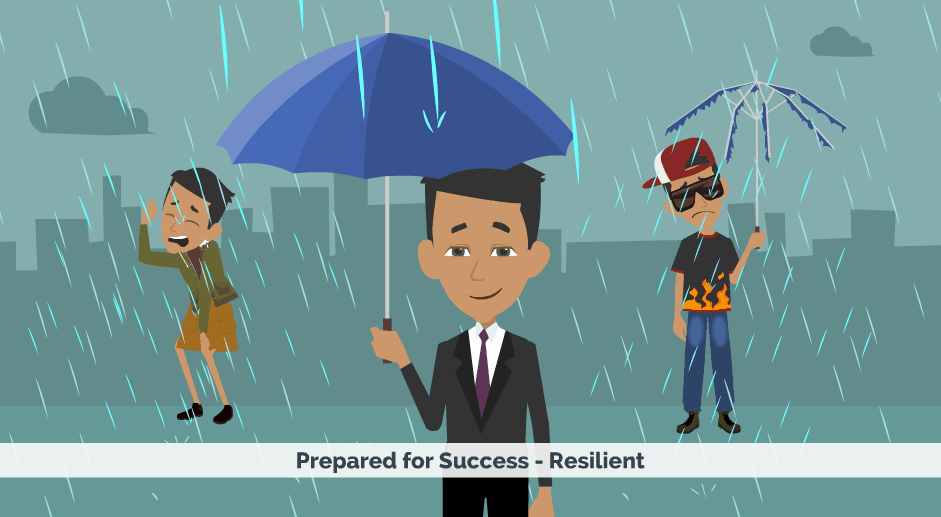Module 04: On the Job Success
Resilience and Success

When facing a difficult task, are you usually able to accomplish your goal or are you more likely to give up? We all face challenges, stress, and change in our lives and in our careers. Building our resilience can help us to recover and adapt to difficult situations.
“If you don’t like something, change it. If you can’t change it, change your attitude.” — Maya Angelou
Herrity, J. (2023) 52 Thought-Provoking Quotes on Managing Change Effectively, Indeed, Retrieved from https://www.indeed.com/career-advice/career-development/quotes-on-managing-change
Your resilience and your belief in your own capacity to deal with various adverse situations can play a significant role within your career success.
Reflection Questions and Video
- What factors do you think contribute to career success?
- Watch the video below and reflect on your formula.
- Would you change or add anything to it?
The Happiness Advantage: Linking Positive Brains to Performance
Achor. S. (2011). The Happiness Advantage: Linking Positive Brains to Performance. Ted Series. Retrieved from https://www.youtube.com/watch?v=GXy__kBVq1M&t=1s
How would you build resilience?
The table below outlines the factors that contribute to career resilience. You can build your resilience by developing the positive factors (in the right hand column) and reducing negative factors (the middle column). For example, if you approach your goals in a flexible way, changing your path as you learn more about yourself and the world of work, you’re more likely to be resilient when faced with unexpected stresses.
Think about each factor and whether you tend to land more on the positive or negative end of the spectrum.
Mouse over the terms below and/or select the “+” button below the table to view the definitions.
Table 4.2 Summary
| Factor | Negative | Positive |
|---|---|---|
| Future Focus | Hopeless | Hopeful |
| Expectations | Naive | Realistic |
| Responsiveness | Blaming | Reflecting |
| Goals | Fixed | Flexible |
| Readiness | Unprepared | Strategic |
| Social Position | Isolated | Supported |
Source: Thomas Staunton: Exploring Building Resilience in a Careers Context
Source: Blog of Tom Staunton https://runninginaforest.wordpress.com/2015/01/26/exploring-building-resilience-in-a-careers-context/
When reflecting on your future career goals, write down what the following factors mean to you. What actions can you take to increase your resilience?
Below is how Jane filled out the table:
| Factor | What it Means for me? | Action |
|---|---|---|
| Hopeful future focus | I would like to be an office manager one day | I will start picturing myself in this role and talking to my network about my career aspirations |
| Realistic expectations | It might take me a few years to accomplish this goal | Info interviews and find a mentor for additional guidance |
| Reflecting attitude | What can I do to increase my chances? What I have already done? | Write some success stories to reflect upon my accomplishments |
| Flexible goals | I might decide to do something else later or even change my career. Be open to new ideas, Jane! | Do research into other areas of interest such as fashion |
| Being strategic | To plan in advance to prepare for the future | Think about possible professional development courses to take |
| Have social support | My network -people who can support me in my career | Attend administrative professional conferences |

Career Resiliency Tips
|
|
Start a new job with curiosity and observe how the business operates. Ask questions during the onboarding period. Curiosity also means showing genuine care for your co-workers. Spend time in conversation to get to know your colleagues better. |
|
|
Being flexible can help you adapt to a new workplace culture. Go with the flow. Are you an employee with flexible attitudes who can take on new challenges on short notice? |
|
|
Show up at work with a positive attitude. Being optimistic at work will help contribute to your career success. |
|
|
Starting a new job also involves a steep learning curve. Keep learning. Find mentors. Being persistence will help you master the required skills necessary for your job. |
|
|
It takes courage to join a workplace, especially one in an unfamiliar country, and to meet new colleagues and clients. The uncertainty during your probation period can cause anxiety. Embrace the uncertainty. |
For more assistance, feel free to make an appointment with the Career Development and Community Engagement.
How you look at the future
Expect things to go badly in the future.
Expect that things will go well in the future.
How accurate your expectations of the future are.
A view based on here-say and assumptions. Usually leads to being surprised and confused about your future career.
An objective and well-researched view of your future career that is more understandable and predictable.
How we respond to failure.
Failure is seen as threatening and your response is to protect your ego by blaming the failure on external factors, such as people, things or circumstances. This doesn’t allow you to learn from your experience and move forward.
Failure is seen as an opportunity to learn and your response is to reflect on the past to gain insights that can be used to adjust your beliefs, attitudes and actions for the future.
Focus or destination of your career.
An unwillingness to change and adapt goals when you or the world of work changes.
A willingness to change and adapt your goals in the face of new realities.
Having what is needed to move your career forward.
Going through a career without a plan and simply reacting to circumstances as they come up.
Going through a career with a long-term plan while being adaptable and flexible.
The extent to which we look for support from other people.
Isolate yourself and aim to act individually.
Look for support from others, which can give you encouragement, feedback, direction and access to opportunities.






